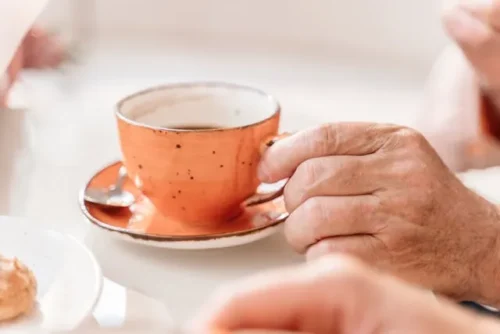How Coffee Affects Medication and Your Body
To understand why mixing medication and coffee is risky, we need to look at how coffee behaves in the body. Coffee contains caffeine, a powerful stimulant. It speeds up your heart rate, stimulates your nervous system, and can increase stomach acid. Caffeine also affects liver enzymes, which are responsible for breaking down many drugs.
When you take medicine, your body tries to absorb and process it properly. But caffeine can either block this process or make it too fast. This can change how much of the drug enters your bloodstream—or how long it stays there.
Why Mixing Medication and Coffee Can Be Dangerous
You might think a sip of coffee won’t hurt. However, even small amounts of caffeine can cause unwanted effects. Let’s take a closer look at why this combination can be dangerous.
1. Reduced Absorption of Medication
Some medications require a calm, stable digestive environment for absorption. Coffee increases stomach acid and speeds up digestion. As a result, your medicine might pass through too quickly. This reduces the amount your body can absorb and makes the medicine less effective.
2. Increased Side Effects
Certain drugs already come with side effects like anxiety, restlessness, or trouble sleeping. Coffee adds to these symptoms. When you mix medication and coffee, the side effects may double or become unbearable.
3. Caffeine Blocks Drug Effectiveness
Caffeine can block the action of some medications altogether. For example, it may reduce the calming effects of anti-anxiety drugs or sedatives. This leaves the user frustrated when the medicine doesn’t work as intended.
Examples of Medication and Coffee Interactions
To make this more practical, here are real-life examples of medicines that can interact poorly with coffee:
Antibiotics
Certain antibiotics, such as ciprofloxacin, slow down the breakdown of caffeine in the liver. As a result, caffeine stays in your system longer, causing headaches, jitteriness, or insomnia. On the flip side, coffee can also reduce how much of the antibiotic your body absorbs.
Specific Antibiotics
Examples; Antibiotics such as Ciprofloxacin and norfloxacin.
Reason; These antibiotics can slow down the breakdown of caffeine in your body, which may result in prolonged and stronger effects like a heart rate and increased nervousness.
Thyroid Medication
Levothyroxine, a common thyroid drug, should never be taken with coffee. Studies show coffee can cut absorption by up to 55%. This can cause thyroid levels to drop, which affects energy, metabolism, and mood.
Thyroid Medications;
Examples; Levothyroxine.
How It Works; Caffeine can interfere with how your body absorbs thyroid medication making it less effective.
Antidepressants
Some antidepressants, especially those from the MAOI class, can have dangerous interactions with caffeine. This combination may raise blood pressure or cause heart rhythm problems. It’s best to wait a few hours between taking your antidepressant and drinking coffee.
Antidepressants;
Examples; Including MAO inhibitors such as phenelzine and tranylcypromine as SSRIs like fluoxetine and sertraline.
Reason; Combining caffeine with antidepressants can elevate the risk of side effects, like blood pressure and increased anxiety.
Blood Pressure Pills
Mixing medication and coffee can work against your treatment if you have high blood pressure. Caffeine raises your blood pressure, especially if you’re not used to it. This counteracts the purpose of your pills and can make it harder to control your condition.
Osteoporosis Medications
Drugs like alendronate (Fosamax) must be taken on an empty stomach with plain water only. Adding coffee can prevent proper absorption and weaken the drug’s effects on bone density.

Timing Matters When Taking Medication and Coffee
Sometimes the issue is not just the mix itself, but the timing. Taking your medicine with coffee in the morning may seem convenient. But that habit can interfere with how the drug works throughout the day.
The safest option is to wait at least one hour after taking your medicine before drinking coffee. Or, take your medication with water and delay your coffee intake. It may take a bit of adjustment, but it protects your health in the long run.
Natural Doesn’t Mean Safe with Medication and Coffee
Some people switch to herbal supplements, thinking they are safer. But even herbal remedies can interact poorly with coffee. For example, St. John’s Wort (used for mood support) can raise serotonin levels. When mixed with caffeine, it may increase the risk of serotonin syndrome—a rare but serious condition.
Even over-the-counter drugs like pain relievers or allergy pills can react with caffeine. It’s always best to check with a pharmacist or doctor before combining them.
Tips to Avoid the Risks of Medication and Coffee
If you’re not ready to give up coffee entirely, that’s understandable. But you can take steps to avoid the worst outcomes.
Check Labels and Instructions
Some prescriptions will warn you about coffee or caffeine. Always read medication labels and ask your pharmacist about food or drink restrictions.
Space Out Coffee and Medicine
As mentioned, wait at least 60 minutes after taking your medicine before drinking coffee. This gives your body time to absorb the drug properly.
Keep a Health Journal
Write down what medications you take and when you drink coffee. If you notice headaches, insomnia, or other symptoms, show the log to your doctor. They can help you spot patterns and suggest changes.
Talk to Your Doctor
Your healthcare provider can guide you on how best to manage medication and coffee in your routine. They may suggest switching the time you take your medicine or using a lower dose of caffeine.
Coffee Alternatives for Medication Users
If you’re concerned about caffeine, there are gentler alternatives that may still give you a morning boost.
- Herbal teas like chamomile or ginger offer warmth without caffeine.
- Decaffeinated coffee can be a middle ground.
- Warm lemon water can improve digestion and hydrate you.
- Golden milk (turmeric and milk) is soothing and anti-inflammatory.
Switching drinks may help you avoid side effects and support your medicine’s effectiveness.
Final Thoughts on Medication and Coffee Safety
The truth is simple: mixing medication and coffee is often a risky choice. Coffee affects how your body processes drugs, reduces their benefits, and increases unwanted effects. While it may be part of your routine, it’s worth making a few adjustments to stay safe.
Talk to your doctor, read labels carefully, and consider spacing out your medication and coffee times. Your body—and your medicine—will thank you.
10 Medications You Should Never Mix With Coffee
“Get trusted advice on dementia care at home and practical tips for looking after someone with dementia at home—all in one place.”

